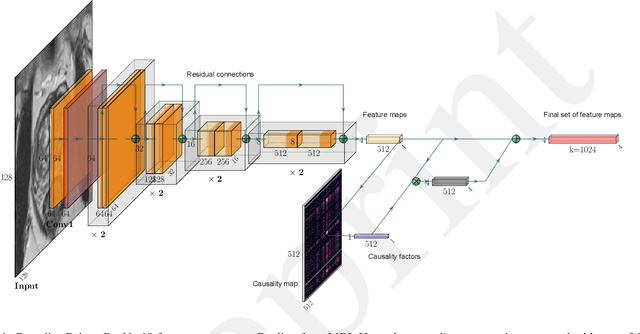Eva Pachetti
Boosting Few-Shot Learning with Disentangled Self-Supervised Learning and Meta-Learning for Medical Image Classification
Mar 26, 2024Abstract:Background and objective: Employing deep learning models in critical domains such as medical imaging poses challenges associated with the limited availability of training data. We present a strategy for improving the performance and generalization capabilities of models trained in low-data regimes. Methods: The proposed method starts with a pre-training phase, where features learned in a self-supervised learning setting are disentangled to improve the robustness of the representations for downstream tasks. We then introduce a meta-fine-tuning step, leveraging related classes between meta-training and meta-testing phases but varying the granularity level. This approach aims to enhance the model's generalization capabilities by exposing it to more challenging classification tasks during meta-training and evaluating it on easier tasks but holding greater clinical relevance during meta-testing. We demonstrate the effectiveness of the proposed approach through a series of experiments exploring several backbones, as well as diverse pre-training and fine-tuning schemes, on two distinct medical tasks, i.e., classification of prostate cancer aggressiveness from MRI data and classification of breast cancer malignity from microscopic images. Results: Our results indicate that the proposed approach consistently yields superior performance w.r.t. ablation experiments, maintaining competitiveness even when a distribution shift between training and evaluation data occurs. Conclusion: Extensive experiments demonstrate the effectiveness and wide applicability of the proposed approach. We hope that this work will add another solution to the arsenal of addressing learning issues in data-scarce imaging domains.
Cine cardiac MRI reconstruction using a convolutional recurrent network with refinement
Sep 23, 2023Abstract:Cine Magnetic Resonance Imaging (MRI) allows for understanding of the heart's function and condition in a non-invasive manner. Undersampling of the $k$-space is employed to reduce the scan duration, thus increasing patient comfort and reducing the risk of motion artefacts, at the cost of reduced image quality. In this challenge paper, we investigate the use of a convolutional recurrent neural network (CRNN) architecture to exploit temporal correlations in supervised cine cardiac MRI reconstruction. This is combined with a single-image super-resolution refinement module to improve single coil reconstruction by 4.4\% in structural similarity and 3.9\% in normalised mean square error compared to a plain CRNN implementation. We deploy a high-pass filter to our $\ell_1$ loss to allow greater emphasis on high-frequency details which are missing in the original data. The proposed model demonstrates considerable enhancements compared to the baseline case and holds promising potential for further improving cardiac MRI reconstruction.
A Systematic Review of Few-Shot Learning in Medical Imaging
Sep 20, 2023Abstract:The lack of annotated medical images limits the performance of deep learning models, which usually need large-scale labelled datasets. Few-shot learning techniques can reduce data scarcity issues and enhance medical image analysis, especially with meta-learning. This systematic review gives a comprehensive overview of few-shot learning in medical imaging. We searched the literature systematically and selected 80 relevant articles published from 2018 to 2023. We clustered the articles based on medical outcomes, such as tumour segmentation, disease classification, and image registration; anatomical structure investigated (i.e. heart, lung, etc.); and the meta-learning method used. For each cluster, we examined the papers' distributions and the results provided by the state-of-the-art. In addition, we identified a generic pipeline shared among all the studies. The review shows that few-shot learning can overcome data scarcity in most outcomes and that meta-learning is a popular choice to perform few-shot learning because it can adapt to new tasks with few labelled samples. In addition, following meta-learning, supervised learning and semi-supervised learning stand out as the predominant techniques employed to tackle few-shot learning challenges in medical imaging and also best performing. Lastly, we observed that the primary application areas predominantly encompass cardiac, pulmonary, and abdominal domains. This systematic review aims to inspire further research to improve medical image analysis and patient care.
Causality-Driven One-Shot Learning for Prostate Cancer Grading from MRI
Sep 19, 2023



Abstract:In this paper, we present a novel method to automatically classify medical images that learns and leverages weak causal signals in the image. Our framework consists of a convolutional neural network backbone and a causality-extractor module that extracts cause-effect relationships between feature maps that can inform the model on the appearance of a feature in one place of the image, given the presence of another feature within some other place of the image. To evaluate the effectiveness of our approach in low-data scenarios, we train our causality-driven architecture in a One-shot learning scheme, where we propose a new meta-learning procedure entailing meta-training and meta-testing tasks that are designed using related classes but at different levels of granularity. We conduct binary and multi-class classification experiments on a publicly available dataset of prostate MRI images. To validate the effectiveness of the proposed causality-driven module, we perform an ablation study and conduct qualitative assessments using class activation maps to highlight regions strongly influencing the network's decision-making process. Our findings show that causal relationships among features play a crucial role in enhancing the model's ability to discern relevant information and yielding more reliable and interpretable predictions. This would make it a promising approach for medical image classification tasks.
 Add to Chrome
Add to Chrome Add to Firefox
Add to Firefox Add to Edge
Add to Edge